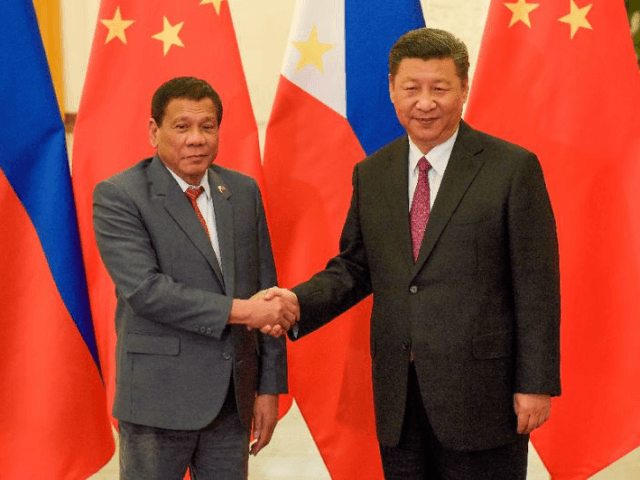The communist government of China announced on Wednesday that it had signed 14 trade deals with the Philippines and offered over $22 million in aid to repair the city of Marawi, site of a failed attempt to establish an Islamic State “caliphate.”
The move follows a successful meeting between Philippines President Rodrigo Duterte and his American counterpart Donald Trump, and an offer by Trump to mediate between the various parties involved in the South China Sea territorial dispute, including both China and the Philippines.
Duterte has eschewed confronting China on its invasion and colonization of Philippine territory in the sea, arguing that Manila’s military is too weak to effectively challenge Beijing’s claims. Support from Trump, as well as a united front by all nations China’s military buildup in the region threatens, could change that calculus.
“Your victory against terrorism is the result of your own efforts. We highly appreciate the courage and the wisdom demonstrated by the Philippine government in the fight against terrorism,” Li Keqiang, the Chinese Premier, said in Manila following the announcement of China’s investment in the rebuilding of Marawi, the only officially “Islamic City” in the majority-Catholic Philippines.
“Both China and the Philippines are countries with large population[s] and we are developing opportunities and markets for each other. If we can work together, I believe it will bring benefits to the people of both countries and the region as a whole,” Li added, according to the Philippine Star.
Li announced that China would invest $22.6 million in Marawi, including construction equipment and humanitarian aid for those remaining after tens of thousands fled the Islamic State siege in May, adding that China had “full confidence” in Duterte. Duterte responded to the investment with gratitude.
“Maybe in the future, the Philippines would also show its debt of gratitude to China for all of the fundings, public works, bridges and all,” he said.
The Chinese state outlet Xinhua confirmed that China and the Philippines signed 14 deals on a variety of topics ranging from infrastructure development to “drug rehabilitation.”
The move appears to be a proactive attempt to bring Duterte firmly into China’s good graces after the Philippine president met with Trump this weekend. Trump expressed gratitude for his “great relationship” with Duterte and called his visit to the Philippines “very successful.” Duterte, on his end, thanked Trump for his support and “words of encouragement” in the war on drugs.
Duterte won the presidency of the nation on a promise to eradicate drug crime. Since his election, thousands of Filipinos have been killed in police raids and other anti-drug activity, raising human rights concerns from the United Nations and international observers.
Trump also appeared to alarm the Chinese government with an offer to Vietnamese President Tran Dai Quang to “mediate” in the South China Sea situation. Beijing has developed a series of artificial islands in Vietnamese and Philippine territory and equipped them with surface-to-air missiles, surveillance technology, and fighter jets, in violation of international law.
“If I can help in any way, I’m a very good mediator and a very good arbitrator,” Trump said last week. “I have done plenty of it from both sides. So if I can help you, let me know.”
Given Duterte’s warmth towards Trump, it is possible Manila may take him up on his offer.
Chinese state publication the Global Times asserted that “obviously” China has no interest in a Trump intervention.
“Washington has already been too active in the South China Sea issue,” a column in the newspaper argued this week. “During the Obama era, U.S. intervention in South China Sea affairs reached a climax. It is unknown if Trump’s self-recommendation is a result of his impulsive style or comes from careful consideration of the issues.”

COMMENTS
Please let us know if you're having issues with commenting.